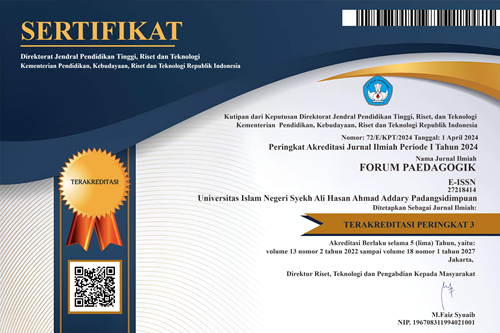SCIENTIFIC PERSPECTIVE OF KNOWING GOD ACCORDING TO MUHAMMAD BIN ABDUL WAHHAB IN THE BOOK OF MATAN AL-USHUL ATS-TSALATSAH
The wrong knowledge that a Muslim must know and learn is the science of monotheism, namely knowing Allah, this knowledge will save him in this world and the hereafter. The aim of the research is to analyze the perspective of knowledge of Allah according to Muhammad bin Abdul Wahhab in the book of Matan Al-Usul Ats-Tsalatsah. A qualitative approach with the type of research library research and analysis of discourse analysis techniques. The research findings that the knowledge of knowing Allah according to Muhammad bin Abdul Wahhab is knowing Allah is the Lord who must be worshiped carrying out orders and avoiding His prohibitions, and not associating partners with Allah by combining monotheism rububiyyah and uluhiyyah. How to God through His signs, namely the night, day, sun, and moon, and also through His creation namely the seven layers of heaven and seven layers of earth. Getting to know Alla by carrying out the acts of worship commanded by Him, namely prayer, Kauf, raja' (hope), trust, raghbah (interested), rahbah (anxious), solemn, khasyyah (fear), inabah (return to Allah), istianah, istiadzah, istigasah, slaughtering sacrificial animals, vows.
Keywords : al-ushul ats-tsalatsah; knowledge of God; muhammad bin abdul wahab
Abdullah, M. (2018). Emulating the Characteristics of Allah's Angels as a Form of Believing in the Existence of Angels. Taklim: Journal of Islamic Religious Education, 16(2), 147-156.
Ahmad. (2019, October). Tawakal in Islamic Perspective. Syaikhuna: Journal of Islamic Education and Institutions, 10(2), 181-192.
Afrizal, LH (2018, February). Rububiyah and Uluhiyah as the Concept of Tawhid (Overview of Interpretation, Hadith and Language). Tasfiyah, 2(1), 41-74.
Al-Attas, SM (2001). Treatise For Muslims. Kuala Lumpur: ISTAC.
Al-Faruqi, AR (2015, September 30). Concept of Science in Islam. Kalimah: Journal of Religious Studies and Islamic Thought, 13(2), 223-234.
Alfi, L. (2018, August 1). The Concept of Science According to Syed Muhammad Naquid Al-Attas (Analysis of Islamic Books and Philosophy of Science). Tasfiyah, 2(2), 195-209.
Al-Sa'di, AI (2003). Taisir Al-Karim Al-Rahman fi Tafsir Kalam Al-Mannan. Beirut: Dar Ibn Hazm.
Al-'Utsaimin, SM (2014). Syarah Ushuluts Tsalatsah: Complete Explanation of the Three Main Foundations. Daar Tsuroyya Lin Nasyri.
Amaliyah, EI (2013, December). The Moral Message of the Doomsday Perspective of the Qur'an. Hermeneutics, 7(2), 297-314.
Arifinal, M. (2016, June 30). The Concept of Knowledge (Al-Qur'an) as the Embodiment of the Teachings of Allah's Knowledge. Al-Qalam, 33(1), 84-104.
Basit, A. (2018, July-December). Muhammad bin Abdul Wahhab: Theological Thoughts and Scholars' Responses Regarding His Thoughts. Tazkiya: Journal of Islam, Society and Culture, 19(2), 53-68.
Dahlan, M. (2018). Prophet Muhammad SAW. (Religious Leader and Head of Government). Rihlah Journal, 6(2), 178-192.
Hanafi. (2017, June). Heaven and Hell in Al-Ghazali's Perception. Ushuluna: Ushuluddin Science Journal, 3(1), 37-66.
Hasbiyallah, & Ihsan, MN (2019, May). The Concept of Recognition of Allah (Ma'rifatullah) Its Implications for Islamic Religious Education. Journal of Perspectives, 3(1), 1-14.
Pledge. (2018). The Concept of Khauf in Tafsir Al-Misbah: An Examination of the Main Thoughts of Sufism M. Quraish Shihab. Mumtaz, 2(1), 27-56.
Ministry of Religion, R. (2019). The Qur'an and Its Translation (Completion of ed.). Jakarta: Latjah Pentashihan Mushaf Al-Qur'an Research and Development Agency and Education Ministry of Religion of the Republic of Indonesia.
Mahdi, A., & Mujahideen. (2014). Practical Research Guidelines for Writing Thesis, Thesis, and Dissertation (1 ed.). Bandung: Alphabet.
Marpaung, IM (2011, December 26). Concept of Science in Islam. At-Ta'dib: Character Education, 6(2), 257-268.
Mursalim. (2011, June). Prayer in the Perspective of the Qur'an. Journal of Al-Ulum, 11(1), 63-78.
Muslimah. (2017, October). Tolerance in Multicultural Life at SMP Negeri 2 Arut Selatan. Journal of Transformative (Islamic Studies), 1(2), 282.
Muslimah, d. (2020). The Easy Way to Make a Research Proposal. Palangka Raya: Narration of Nara.
Muslimah, d. (2020, November). The Science in Islamic Perspective. International Research Journal of Management, IT & Social Science, 7(6), 66-71.
Nurjanah. (2014, June). The Five Pillars of Islam As Forms Muslim Personality. Hisbah Journal, 11(1), 37-52.
Nursi, BS (2011). Al-Lama'at (6 ed.). (IQ Al-Sholihi, Trans.) Cairo: Dar Soezler Publisher.
Rahmawati. (2013, May 1). Knowing God in the Perspective of Sufism. Al-Munzir, 6(1), 100-109.
Sansayto, T., & Fakhiroh, AZ (2018, September 1). The Concept of Science According to Fakhr Al-Din Al-Razi. Kalimah: Journal of the Study of Religions and Islamic Thought, 16(2), 159-177.
Sartiyati. (2011, October). Sacrifice as a Symbol in Islamic Teachings. Media Academica, 26(4), 567-586.
Schiffrin, D. (2007). The Discourse Study Plan. Yogyakarta: Learning Library.
Shomiyatun. (2017, October 17). The Concept of Science in the Islamic View. Al-Misbah: Journal of Islamic Studies, 5(1), 15-33.
Suarni. (2016). History of Hijrah in the Perspective of the Qur'an. Al-Mu'ashirah, 13(2), 144-156.
Taulabi, I. (2013). Movement Puritanism Muhammad bin Abdul Wahhab. Tribakti: Journal of Islamic Thought, 19(1).
Talib, MD (2015). Destiny and Sunnatullah (A Study of Maudhu'i Interpretation). Al-Ishlah: Journal of Educational Studies, 13(1), 28-38.
Ulum, IM (2013). The Conception of Tawhid According to Muhammad bin Abdul Wahhab and Its Implications for the Purpose of Islamic Education. Logic: Unswagati Cirebon Lemlit Scientific Journal, 9(3), 94-105.
Wahhab, IM (2019). Al-Usul Ats-Tsalatsah: 3 Main Foundations of Islamic Aqidah (2 ed.). (MI Anshori, Trans.) Solo: Arafah Library.
Wahhab, SI (2013). Al-Usul Ats-Tsalatsah. Egypt: Dar Ibn Jauzi.
Wahid, A. (2016). The Concept of Ihsan Perspective of the Qur'an. Thesis, pp. 133-135.
 Copyright (c) 2022 Muslimah
Copyright (c) 2022 Muslimah

This work is licensed under a Creative Commons Attribution-ShareAlike 4.0 International License.











